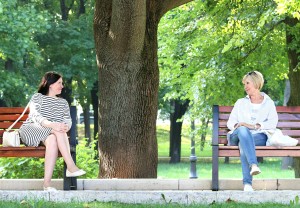Dr Lesley Kay is a Senior Lecturer in Midwifery at the Kingston & St George’s University of London. She presented her talk, Hearing stories of birth in pregnancy: A hermeneutic phenomenological study of women’s experiences across two generations, at the 2016 Normal Labour and Birth Conference and I’m just getting around to telling you about it now! It stayed with me and I’ve been wanting to write about it for months.
What was clear to me was how important stories are for us, as humans and as a culture – especially birth stories. Stories tell us what’s possible and how we can be in the world.
The stories we tell each other are also indicative of what’s acceptable to tell in our culture, and this has changed across the generations from our mothers to us. So just as stories shape culture, our culture shapes our stories. This is especially true in the realm of birth and pregnancy.
Birth Stories in Older and Younger Generations
For instance, in this study across two generations of mothers and pregnant women, Lesley discovered that in the 70s and 80s women predominantly talked about pregnancy and birth in terms of safety and a healthy baby.
They accepted medical staff coming in to the birthing space and dominating their care. This was considered okay. There was talk of birthing in a hospital bed but other options were not often mentioned. Birth was difficult and challenging.
What was often not shared as part of their storytelling was the experience of themselves as women, how they felt about their birth and how they moved forward from that afterwards.
By contrast, the younger group talked about birth choices, but they were anxious about having options. They felt they had to follow the experts. They talked about wanting support and control but felt they didn’t get that.
Part of the common birth story is that most women scream when birthing (which isn’t ladylike) and birth is traumatic. A “good” birth is a healthy baby at the end, no matter what the birth itself was like. The main message across both generations was that birth is a process to be managed – intervention is normal and makes birth safe.
Negative Birth Stories are the Norm
In Lesley’s work, she found there was a prevalence of horror stories as opposed to positive birth stories, which were more alien.
According to her gathering of stories, horrifying dramatic birth is now the new ordinary as it is so familiar.
Stories about home births were ridiculed and in general, the women were sceptical and dubious about positive birth stories.
Birth drama was reinforced the more the birth story was told. That is part of the problem with birth stories in a sense. They recreate the trauma rather than help to heal it.
How We Share Birth Stories
Birth stories are not limited to talk between women. Most films that include birth in their stories have the following elements present:
- The woman can’t manage on her own.
- The doctor will save them.
- Having a good experience is a bit of an ask.
Few films tell the alternative story: that birth does not necessarily involve intense pain, that intervention is often unnecessary and that birth can in fact be orgasmic. Few birth stories tell it this way and this is not the usual experience that most women expect.
Storytelling is as important a communication method for birth stories now as it has always been. The difference is that now we have a plethora of storytelling platforms that weren’t explored in Lesley’s study such as mummy bloggers, Facebook, Twitter, Instagram, text messaging, emails and everything else in between.
These media are all curating the stories that we as a culture are telling each other about birth – how often are these stories positive? How much of an impact is widespread negativity having on actual birth experiences?
Think about it. A woman preparing to give birth will to some degree shape her experience according to what she expects and visualises. A birth characterised by fear frequently has a more negative outcome than one where the woman anticipates a powerful, transformative and safe outcome.
The Future of Birth Stories
The storytelling space is an interesting one to watch. Lesley feels that our next step is to talk to children about their thoughts on birth and she has begun to do this (she has spoken to children under ten years of age as part of her research). What was interesting about those findings was that the kids’ ideas on birth had already taken shape.
It seems important to think about how we talk about birth, especially around our children and other people’s children. The birth stories we tell have an impact on our human society – one that may go far deeper than we imagine.
Do you feel that attitudes to birth and the stories we tell have shaped the way we think about pregnancy and birth?
Discover both the science and the ancient wisdom of birthing. Be inspired to reach your dreams and goals. Be guided to listen to yourself and trust yourself. Learn about pregnancy, birth and parenting – all in the one place – online at our Bumps Births Babies – Holistic Health Conference. Instant access. Available NOW.

Speak Your Mind